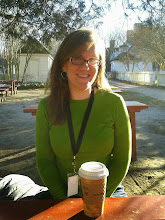Today in Confirmation the plan was to party it up a little and have a nice talk about sin. So last night when I got home from my grand tour of church interviews, I sat down at my computer and tried to adapt Genesis 2-3 to a readable, informal little skit for the kids to do, as a starting point for our discussion.
As I decided which parts to keep and which parts to cut out--so that we could all understand what was going on without having to read two entire chapters out loud and risk losing everybody--I grew a little concerned. I started to remember that maybe I didn't really know what the point of the story was.
What did Adam and Eve do wrong? That's what I wanted to ask my class, but I wasn't sure I had the answer, or any good answers, even. OK, they weren't supposed to eat from this one tree, and they did, and that was a problem. But it seemed like a pretty arbitrary rule. Like God's just making up stuff for no reason. Isn't knowledge of good and evil a good thing? Isn't it what we try to instill in kids as they grow up? Doesn't it help us to make the right choices? You might say that it sets up a dichotomy that wasn't there before. But the tree doesn't create the existence of evil, it only helps us see it. So I was afraid of how this discussion might go. I wasn't quite sure what I was trying to teach using this story, besides that a discussion of sin without the story of the Fall seemed to lack a certain traditional quality.
I didn't wake up this morning with any better idea, but we read the skit together, and I asked, "So what did Adam and Eve do wrong?"
"They disobeyed. They ate from the tree when God said not to," a few of the kids offered.
"Yeah," I said, "and that's bad in itself, but why didn't God want them to eat from the tree? What's wrong with having a knowledge of good and evil?"
"Maybe," said a sixth-grade boy, "because then we can look at other people and call them good or evil."
Bam! I love it! What an insight! Eating the fruit of the Tree of the Knowledge of Good and Evil makes us judge people. Maybe this knowledge means we can't just accept each other as part of God's good creation anymore. Faults we didn't see before come into view. That might be a good and helpful thing when we're examining our own hearts and lives, but probably not so much when it means we start examining others.
Thinking about the story last night, I probably would have said that the core of the problem was wanting to be like God. That's a pretty standard reading; that's what the serpent offers with the fruit. And this new insight fits right in, I think. We want to be like God, deeming things righteous or not. Deciding for ourselves what (and who) is a blessing or a curse. When really, all God wanted for us was to accept, enjoy, and live the abundant life we're created for--the life that God called good.
So thanks, kids, for reminding me again that I don't need to show up with solid answers, and for giving me an interesting sermon somewhere down the line.
Subscribe to:
Post Comments (Atom)

interesting thought
ReplyDelete